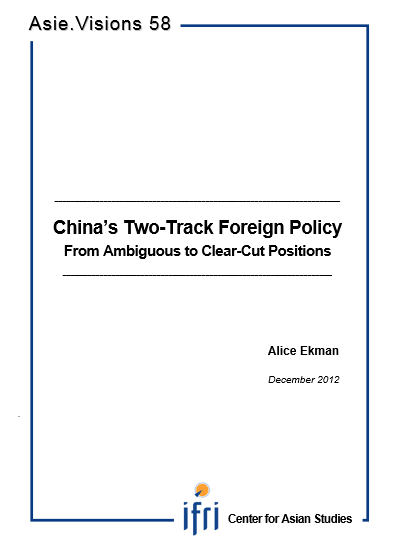China's Two-Track Foreign Policy: From Ambiguous to Clear-Cut Positions

This analysis examines the current ambiguities, priorities and approaches of Chinese foreign policy from a practitioner’s perspective, taking into account experiences of Beijing-based diplomats (interviews conducted in 2011 and 2012), in addition to recent Chinese foreign policy positions and official communications.
It leads to the following conclusions:
- The Chinese position on many foreign policy issues (climate change, nuclear proliferation, etc.) is hard to identify, even by practitioners in regular contact with Chinese diplomacy.
- If ambiguity remains, it is not only because of strategic opacity; on a majority of issues, China has not clearly decided on a position.
- Depending on the issue at stake, China adopts different foreign policy approaches. Two main approaches can be identified: when “core interests” are involved, China has a clear position and may adopt a more proactive foreign policy if needed. For other interests, the Chinese position is often undecided, and remains flexible depending on situational changes. In these cases, China adopts a passive foreign policy approach.
- Rhythm and relationship to time also differs according to this divide: China’s diplomacy tends to be much more anticipative and its decision-making process faster and more streamlined when dealing with “core interests” than with other interests.
- Lately, China’s definition of “core interests” is enlarging (inclusion of South China sea, of economic interests in general terms, etc.). This certainly reflects a reorientation of China’s foreign policy, but not a turning point.
- China’s foreign policy is likely to remain based on these two different approaches in the short and medium run, for several reasons: it is in China’s interest; domestic and international pressures for a more proactive strategy are limited; current foreign policy institutional mechanisms as well as the absence of clear-cut ideological foundations prevent the emergence of a more consistent strategy and; above all, the central government’s top priority remains domestic stability.

Available in:
Regions and themes
ISBN / ISSN
Share
Download the full analysis
This page contains only a summary of our work. If you would like to have access to all the information from our research on the subject, you can download the full version in PDF format.
China's Two-Track Foreign Policy: From Ambiguous to Clear-Cut Positions
Related centers and programs
Discover our other research centers and programsFind out more
Discover all our analysesThe U.S. Policy Toward Taiwan Beyond Donald Trump: Mapping the American Stakeholders of U.S.-Taiwan Relations
Donald Trump’s return to the White House reintroduced acute uncertainty into the security commitment of the United States (U.S.) to Taiwan. Unlike President Joe Biden, who repeatedly stated the determination to defend Taiwan, President Trump refrains from commenting on the hypothetical U.S. response in the context of a cross-Strait crisis.

China’s Strategy Toward Pacific Island countries: Countering Taiwan and Western Influence
Over the past decade, China has deployed a diplomatic strategy toward the Pacific Island Countries (PICs). This strategy pursues two main objectives: countering Taiwan's diplomatic influence in the region and countering the influence of liberal democracies in what Beijing refers to as the "Global South."

Opening up the G7 to South Korea to Address Contemporary Global Challenges
The G7’s global influence has diminished as powers like China reshape international governance through initiatives such as BRICS and the Shanghai Cooperation Organisation (SCO). With the G7 now representing just 10 per cent of the world’s population and 28 per cent of global GDP, its relevance is increasingly questioned.
Expanding SPDMM as a pivotal institution in the Pacific – A French perspective
The South Pacific Defence Ministers’ Meeting (SPDMM) is the only forum that brings together defense ministers from the wider South Pacific — including Chile, which is hosting it for the first time. This heterogeneous group of countries with varying resources, capacities, and interests — Australia, Chile, Fiji, France, New Zealand, Papua New Guinea (PNG), and Tonga — are united by their shared determination to strengthen cooperation on maritime security and humanitarian assistance and disaster relief (HADR) activities.









